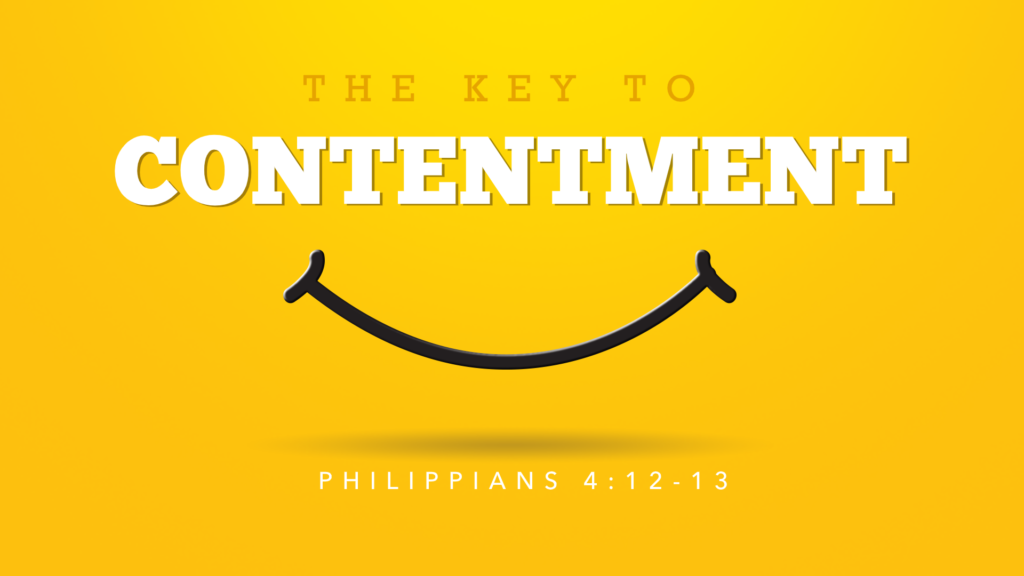
“The Key to Contentment”

The Key to Contentment
I know what it is to be in need, and I know what it is to have plenty. I have learned the secret of being content in any and every situation, whether well fed or hungry, whether living in plenty or in want. I can do all this through him who gives me strength. –Philippians 4:12-13 (NIV)
When Paul wrote Philippians 4, he was writing the Philippian church from prison. He was thanking them for their gifts. He made a point to explain that while he was indeed grateful, even if they did not send him any support at all, Christ was enough. How many of us want to agree with Paul that regardless of any circumstance, Christ is enough?
Contentment—the state of happiness or satisfaction—is a somewhat elusive goal for most of us. We do things that we expect will meet our need for contentment, then we realize that nothing on this earth will provide the infinite stream of happiness and satisfaction we desire on a daily basis. Contentment, for us as Christians, is actually better defined as being at peace with the will of God. It is a matter of the heart that trusts God to govern our worldly affairs, and even though we may go through trials and troubles, we are at peace with his sovereignty. Contentment does not mean we don’t feel pain or suffering. Our faith in God does not eliminate our human emotions. But it should thoroughly affect how we react under circumstances and how we relate to God and others as a result all throughout every experience.
In recent weeks, I have heard a number of people commenting about how well things were going financially, relationally, and otherwise, “and then the pandemic hit”. Now, we are forced to assess this lingering situation under special circumstances. The dictionary defines “circumstance” as a “condition, detail, part, or attribute, with respect to time, place, manner, agent, etcetera, that accompanies, determines, influences, or modifies a fact or event”. In simpler words, a circumstance is a modifying or influencing factor. This pandemic has definitely presented as a modifying factor! Yet, if we look to the example set by the Apostle Paul, this pandemic would not matter. You see, whether times were good or bad…regardless of any circumstance (or modifying or influencing factor), as long as he had Christ, he was content. The idea of being content, regardless of any circumstance, is a worthwhile goal for every Christian. What is the key to achieving this Paul-like contentment, though?
While we may want to agree with Paul that Christ is enough, the key to being content isn’t giving lip service to this matter. Saying “Christ is enough” is not enough. You must truly believe it to be so. Paul believed it to be so. His relationship with God through Jesus Christ served as the strong basis for his contentment. Here are the key factors Paul realized as he achieved this contentment we all desire:
Paul was grateful to God “in ALL circumstances”: Give thanks in all circumstances; for this is God’s will for you in Christ Jesus. —1 Thessalonians 5:18 (NIV)
Paul trusted that God was working everything out for his good: And we know that in all things God works for the good of those who love him, who have been called according to his purpose. —Romans 8:28 (NIV)
Paul understood, as he wrote in 1 Timothy 6:6, that godliness with contentment is great gain, and he learned to stay focused on his purpose in God despite his suffering: That is why, for Christ’s sake, I delight in weaknesses, in insults, in hardships, in persecutions, in difficulties. For when I am weak, then I am strong. —2 Corinthians 12:10 (NIV)
Paul was committed to living for Christ. He realized how earthly cares could interfere with this and he was careful to rely on God’s help to avoid the pitfalls. He specifically addressed this in Hebrews 13:5 when he wrote, “Keep your lives free from the love of money and be content with what you have, because God has said, “Never will I leave you; never will I forsake you.”
Paul was thoroughly convinced that any life was better with Christ than without. He was so grateful for his life in Christ, and he trusted God to strengthen him to endure whatever circumstance he experienced. He kept his focus on the most important thing, which was God, and he shared the Gospel with others so they might also benefit from the promises of God. And therein lies the key to contentment!
When times are good and our pockets are fat, it is much easier to think and to behave appropriately as Christians. But when times are hard and our pockets are lean, we can find ourselves exhibiting unchristian-like behavior and excusing our less than faithful attitudes. We can express discontentment, a lack of trust in God, and outright disobedience. Prophetess Smith has urged every one of us to consider our ways, to assess where we are in Christ, and to make preparations for the end of days. Instead of attempting to justify ourselves in any way, we should appreciate the revelation of our true status and take whatever steps are necessary to resolve anything that hinders our commitment to Christ. It is a very personal matter for each one of us. Discontentment, especially during these uncertain times, must be overcome. As we await what God will do next, let us not miss this opportunity to discover the key to contentment for ourselves.
So do not fear, for I am with you; do not be dismayed, for I am your God. I will strengthen you and help you; I will uphold you with my righteous right hand. –Isaiah 41:10 (NIV)
